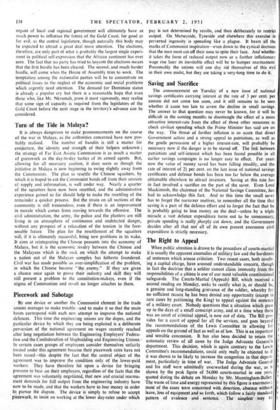Saving and Sacrifice
The announcement on Tuesday of a new issue of national savings certificates carrying interest at the rate of 3 per cent. per annum did not come too soon, and it still remains to be seen whether it came too late to arrest the decline in small savings. The answer to that question may never be known, for it will be difficult in the coming months to disentangle the effect of a more attractive interest-rate from the effect of those other measures to check civilian spending which the Prime Minister has said are on the way. The threat of further inflation is so acute that direct Government action and a strong appeal to patriotism, as well as the gentle persuasion of a higher interest-rate, will probably be necessary now if the danger is to be staved off. The link between patriotism and self-interest which has been found possible in all earlier savings campaigns is no longer easy to effect. For years now the value of money saved has been falling steadily, and the rate of interest of 21 per cent. on the last issue of national savings certificates and defence bonds has been too far below the average obtainable -elsewhere to attract investors. Saving at this rate has in fact involved a sacrifice on the part of the saver. Even Lord Mackintosh, the chairman of the National Savings Committee, has had to acknowledge this fact. And so this time the small saver has to forget the narrower motives, to remember all the time that saving is a part of the defence effort and to forget the fact that he is probably going to lose money on the deal—unless by a triple miracle a vast defence expenditure turns out to be unnecessary, private spending is really vsharply cut down, and the Government decides after all that not all of its own present enormous civil expenditure is strictly necessary.


































 Previous page
Previous page